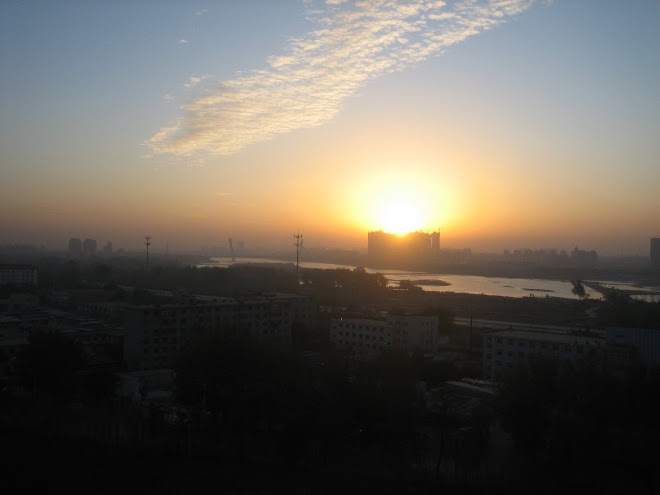For Alain's birthday, we crossed the border of Liaoning province into Inner Mongolia to spend the weekend in a small village called "Da Qing Gou", or Big Green Valley in Chinese. Inner Mongolia, not to be confused with the nation of Monglia, is an autonomous region in the northeast of China (see map below for the section of Northeast China), and approximately 200 kilometers by car. 
map from chinatravelguide.com
Upon our arrival in Da Qing Gou, our shuttle bus pulled up to a tourist driven Mongolian-style yurt park, where we were given tours of several yurts. Yurts, are a tradition form of housing for many Asian cultures, that look a bit like a round tent-like hut. We were told that the small yurts could house 4-8 people, the medium sized yurts up to 12, and the large yurts up to 20 people.
Even though there were only eight of us, we chose the largest yurt, for the cost of 200 yuan per night (30 dollars), so that we would have plenty of space not to breathe on each other while sleeping. With the yurt, we were provided with some tables and small stools, blankets, pillows, a television (complete with Karaoke mikes, of course), and some small mats to sleep on. The owner of the yurt then took our order for dinner later that night, which included a whole lamb, that she later had her husband buy at the market, and the cook killed, cleaned, and cooked it for us.

After settling in, we went horse back riding for a few hours, to get a view of the local terrain in the sunset. We rode 14 kilometers, through rolling grass plains and sand desserts. The view was spectacular. 



We went to a local light show later that night, where local performers sang and danced in Mongolian, under a chilly clear night (that we don't often see in Shenyang). Towards the end of show, everyone from the benches got up, and danced around the fire in the middle of the stage.
We finished the night eating and playing poker, before climbing into our own blankets in the early dawn hours.

The next day, we ate a quick breakfast (lunch), before going rafting in the freezing river that runs through the valley of Da Qing Gou. There, we bought shorts, slippers, water guns, pots and pans (for water fights, not for cooking) got into our rafts, and sprayed each other in a full out water war. After the first 5 minutes, we were all so cold that it hurt, so we stopped and floated peacefully down the river.
On the way back later that afternoon, we stopped in the nearby city for dinner, where everything is bilingual. In Inner Monglia, the children are taught both Mongolian and Mandarin in school, and all the signs in the city can be seen in both these languages.

